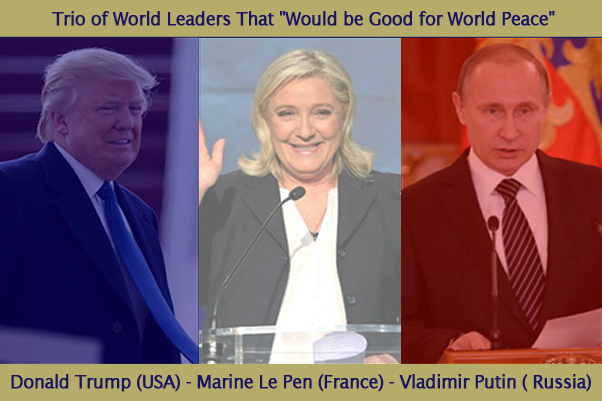ALL EYES WILL BE ON FRANCE IN 2017. France is a highly significant barometer of world affairs, a definite nation to watch. Not only is France the “Eldest Daughter of the Church” and the home of an army of saints, she is also poised to disrupt global liberalism, restore the nation’s Catholic patrimony, reconfigure the European Union, and to form a political-economic-cultural link with Russia to bring about the end of liberalism and an era of world peace. If anyone thought the Trump campaign was a saga, just wait until spring 2017 when the global forces of liberalism will be at the throat of Le Pen.
Yesterday, the center right Republican Party of France held the first round of its primary election to choose its candidate for president. Surprising, Nicolas Sarkozy was bypassed by Alain Juppe (who came in second) and by a former prime minister, Francois Fillon (appointed as prime minister by President Sarkozy, 2007-2012) who came from behind to bypass both Juppe and Sarkozy. Since neither Fillon nor Juppe received a simple majority of the vote, according to French election law, there must be a second round run-off, which will occur this Sunday.
Thus, Fillon will now square off against Juppe, who was the favorite, going into the first round, for his party’s nomination as the Center-Right candidate. The winner of the run-off will go head to head with Marine Le Pen for the presidency of France on April 23, 2017. Right now eyes are focused on Fillon versus Juppe for the Republican nomination. As conservative Republicans, both Fillon and Juppe want to (1) decrease taxes on corporations (offset somewhat by a VAT tax), (2) cut public spending and civil service jobs and are (3) unfavorable toward labor unions and the socially liberal left.
Fillon, however, (in a bid for Catholic votes) has indicated that although not against gay marriage per se, he will abrogate a French law that permits homosexual couples to adopt children; he has also voiced support for President Bashar al Assad of Syria, wishes to expel radical Jihadists and seeks to establish political ties with Russia and Iran.
Juppe, on the other hand, wants to retain political asylum for radical Islamists (engineering some type of in-house detention), favors homosexual adoption and is opposed to Russia, Syria and Iran and therefor to any rapprochement between France (and by extension, the EU) and Russia of the type envisioned by Fillon.
Although Sarkozy has admitted defeat and thrown his support behind Fillon, most apprehensive liberals and hopeful patriots are looking beyond the Fillon-Juppe contest to envision a possible Fillon versus Le Pen contest in the spring of 2017. Marine Le Pen, who just a few years ago was a political nobody, appears to be securely in the driver’s seat. Fillon represents the right, esp on economic issues and Le Pen the far-right, more-so on cultural issues. She has made great progress revamping and brightening the public image of the National Front at a moment in history that is favorable to much of her party’s platform. Most political experts are expecting Le Pen to ease by the first round of the presidential elections in April as both the center and far right candidates squeeze out the socialists on the left and and then square off against each other in the decisive second round. At this point, things do not seem favorable for either Fillon or Juppe.
Both are opposed to labor at a time of labor unrest throughout Europe and France; both are advocates of deregulation at a time when popular sentiment is aroused against corporate business and international finance desiring to see it reigned in by policies and laws that protect the common good and not just the interests of a few. To make matters worse, both Fillon and Juppe advocate reducing public sector employment to fund tax breaks for the wealthy at a time when public sentiment is soured by austerity and emotional reservoirs are unleashing a pent up demand for justice and an end to what is perceived as greed and exploitation.
The white working class has had enough of both conservative economic policies and of the liberal social agenda. Will they rise in France as they have in Hungary, Poland, Slovakia, and the US? While far-right candidates cannot normally expect support from the left; in this case it is the economic woes coming from the right that could trump their disdain for the culture agenda of Le Pen and throw them into her camp along with the white underrepresented worker. Although this is unlikely, it is increasingly possible as the left social agenda has become blatantly appalling to many at the same time that the economy is suffering a severe setback and in need of major structural readjustments.
Fillon, represents a unique challenge to Le Pen. Interestingly, both Fillon and Le Pen are pro-Russian. Fillon also supports immigration quotas and a coalition with Russia to counter terrorism. According to Bloomberg, Fillon, like Le Pen:
“…has consistently backed Russia in Syria since 2012, saying Moscow could be instrumental in resolving the conflict and refraining from calling for Syrian President Bashar Al-Assad’s removal until the Islamic State is defeated. In 2013, Fillon was a guest of the Valdai forum, which Putin and his foreign policy elite use to communicate Russia’s policy views to Western experts; apart from calling for cooperation in Syria, he expressed hope that Europe would soon abolish short-term visas for Russia.”
“Fillon has also been fervently against economic sanctions against Russia following Putin’s Crimean escapade. In April, Fillon welcomed a French parliament resolution that called for lifting the sanctions. He called them “inept and strategically devastating for our farmers” as well as counterproductive. Russia, along with France, is involved in fighting the Islamic State, he reasoned.”
As such, the pro-liberal French media does not support Fillon as it does Juppe and continued liberalism. According to political analyst Eric Verhaeghe, the media in France
“….mainly supports Paris’ alliance with the US and French-German relations. “Yet in reality there is a large part of public opinion in France that (does) not often speak out openly, but know that there can be no balance in Europe without a renewed and consistent alliance with Russia.“
“The French elite previously didn’t feel the necessity to express its position on Francois Fillon as they didn’t think he would have had any chances to be elected. But now they see that he poses a real ‘threat’ [to their established relations with Washington and Berlin] and become interested in his program.”
According to Politico, Fillon has referred to Russia as a “crucial partner” for both France and Europe, has advocated lifting EU sanctions against her, and has blamed Western powers for having “provoked” Russia by expanding NATO too close to its borders.
Due to the these similarities between Fillon and Le Pen, “Le Pen boasted that the Republicans’ primary had been fought on her themes: French identity, reconsideration of France’s role in Europe, and a crackdown on immigration and jihadists.” These themes are likely to carry over to center stage during the spring presidential election.
Because of this likely eventuality, Sébastien Chênu, Head of Public Relations for Le Pen, has stated that Juppe would be a preferable opponent for Le Pen; he would be easier to defeat than Fillon:
“Juppe would have made a very good opponent for Le Pen… “He represented privilege, elitism, Europe — everything the French are tired of seeing. And he would not be a very energetic campaigner.”
With the surprise first round primary victory by Fillon, Le Pen must rethink her strategy due to the likelihood of vying with a political opponent less at odds with her Euro-skeptic agenda. Her most probable move will be depicting Fillon as an EU globalist friend of crony-capitalism.
Le Pen recently stated her election as president would result in the formation of a trio of world leaders (Le Pen – Trump – Putin) that “would be good for world peace”. She also stated that
“There is a worldwide movement. A worldwide movement which rejects unchecked globalisation, destructive ultra-liberalism … the elimination of nation states, the disappearance of borders….The forces at work in these various elections are ideas, forces which could bring about my election as the president of France next May.”
If Fillon defeats Juppe, and chances are he will, France will be running two pro-Putin anti-liberal Middle East military campaign candidates for president. Either way, no matter who wins this election (Fillon or Le Pen), there will be a likely rapprochement with Russia as New Era has been indicating since its inception.








Great article
Thank you for the post on your blog. Do you provide an RSS feed?